Tools
Control which tools and capabilities are available to the LLM in your collaborations through tool sets, tool configurations, and plugins.
Understanding Tools and Tool Sets
BB's power comes from giving the LLM access to the right tools for your workflow. Rather than overwhelming every collaboration with every possible capability, you can precisely control which tools are available.
Key Concepts:
- Tools: Individual capabilities the LLM can use (e.g., edit_resource, search_web, run_command)
- Tool Sets: Named collections of related tools (e.g., 'core', 'coding', 'research')
- Tool Configurations: Settings that control how individual tools behave
- Global Settings: Default tool sets and configurations for all projects
- Project Settings: Project-specific tool sets and configurations that override global defaults
How It Works
When you start a collaboration, BB provides the LLM with tools based on your selected tool sets. The LLM can then use these tools to accomplish your objectives.
- Select tool sets at global or project level
- Configure individual tool settings with YAML
- Project settings completely override global settings
- Custom tool sets combine tools from any source
- Tools can come from built-in sets, BB plugins, or MCP servers
Built-in Tool Sets
BB includes 17 pre-defined tool sets that group related capabilities. Select the tool sets that match your workflow needs.
Essential Tool Sets
core
Essential operations: file discovery, reading, and collaboration management. Always enabled by default.
Tools: load_datasource, load_resources, find_resources, forget_resources, display_resource
editing
Resource modification: create, edit, rename, move, and delete files.
Tools: edit_resource, write_resource, remove_resources, rename_resources, move_resources
admin
System administration: debugging, metrics, task delegation, and advanced operations.
Tools: interaction_metrics, delegate_tasks, multi_model_query, run_command
Development Tool Sets
coding
Software development: patching, command execution, web research.
testing
QA and validation workflows (plugin tools).
devops
CI/CD, deployment, infrastructure management.
security
Security scanning, compliance, vulnerability assessment.
Content & Research Tool Sets
research
Web research and information gathering.
creative
Creative workflows: image manipulation, visual content.
content
Media processing: transcription, translation, conversion.
Data & Integration Tool Sets
data
Data analysis, database queries, business intelligence.
integration
External service integrations: APIs, CRM, cloud services.
communication
Messaging, email, calendar, team collaboration.
Specialized Tool Sets
professional
Domain expertise: legal, medical, financial tools.
ai
AI/ML operations: training, inference, embeddings.
utility
General utilities, system automation, scripting.
mcp
Tools from Model Context Protocol servers.
Special Tool Set: Use all to enable every available tool regardless of categorization. Best for admin/debug workflows.
Selecting Tool Sets
Tool sets can be configured at both global and project levels. Project settings completely override global settings when specified.
Global Tool Sets
Set default tool sets for all projects through the Global Settings interface. These provide your baseline tool availability.
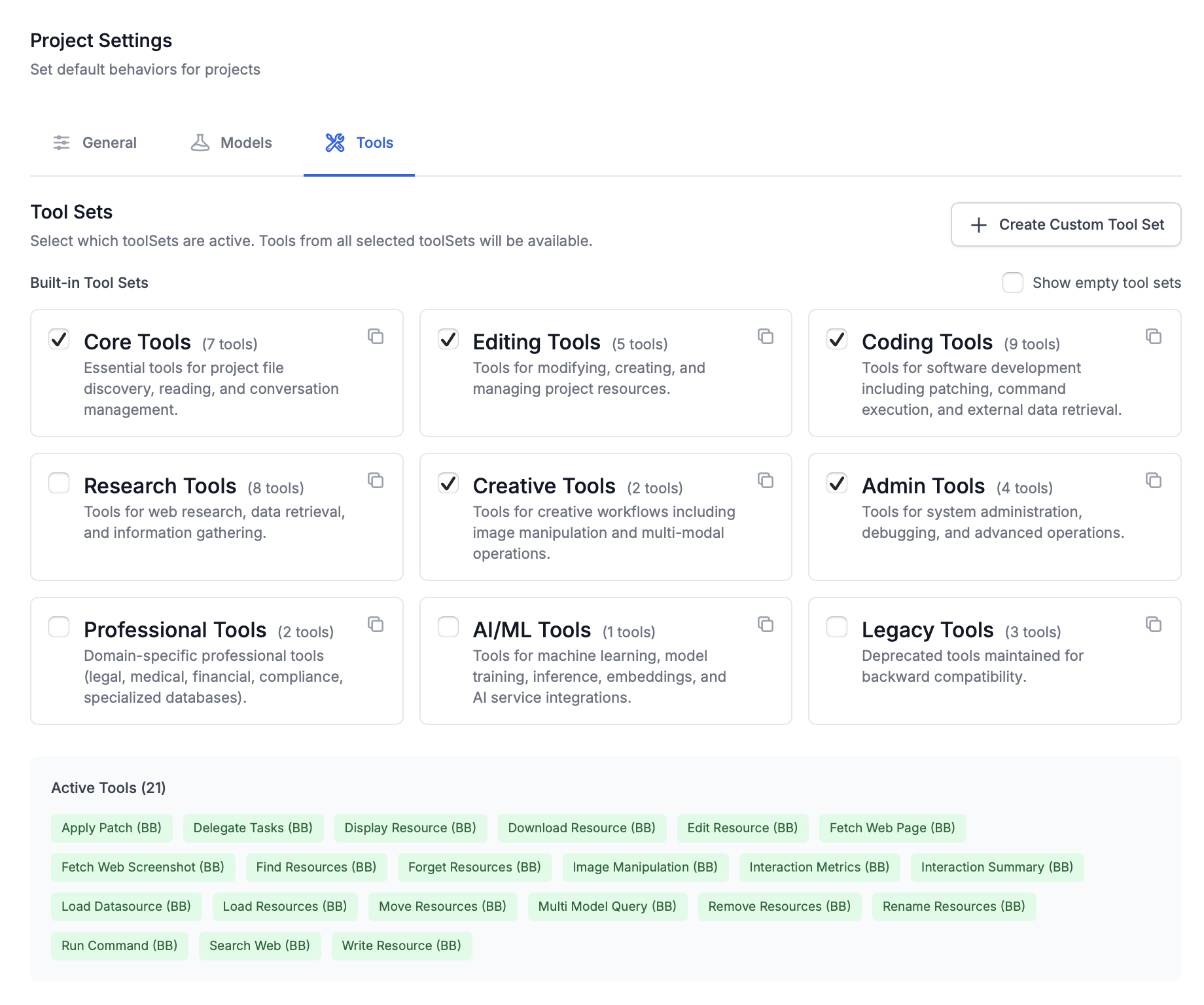
Common Global Configurations:
- General Development: core, editing, coding
- Research Projects: core, research, data
- Content Creation: core, editing, creative, content
- DevOps Work: core, editing, coding, devops, security
Project Tool Sets
Override global settings with project-specific tool set selections. Perfect for specialized workflows or restricted environments.
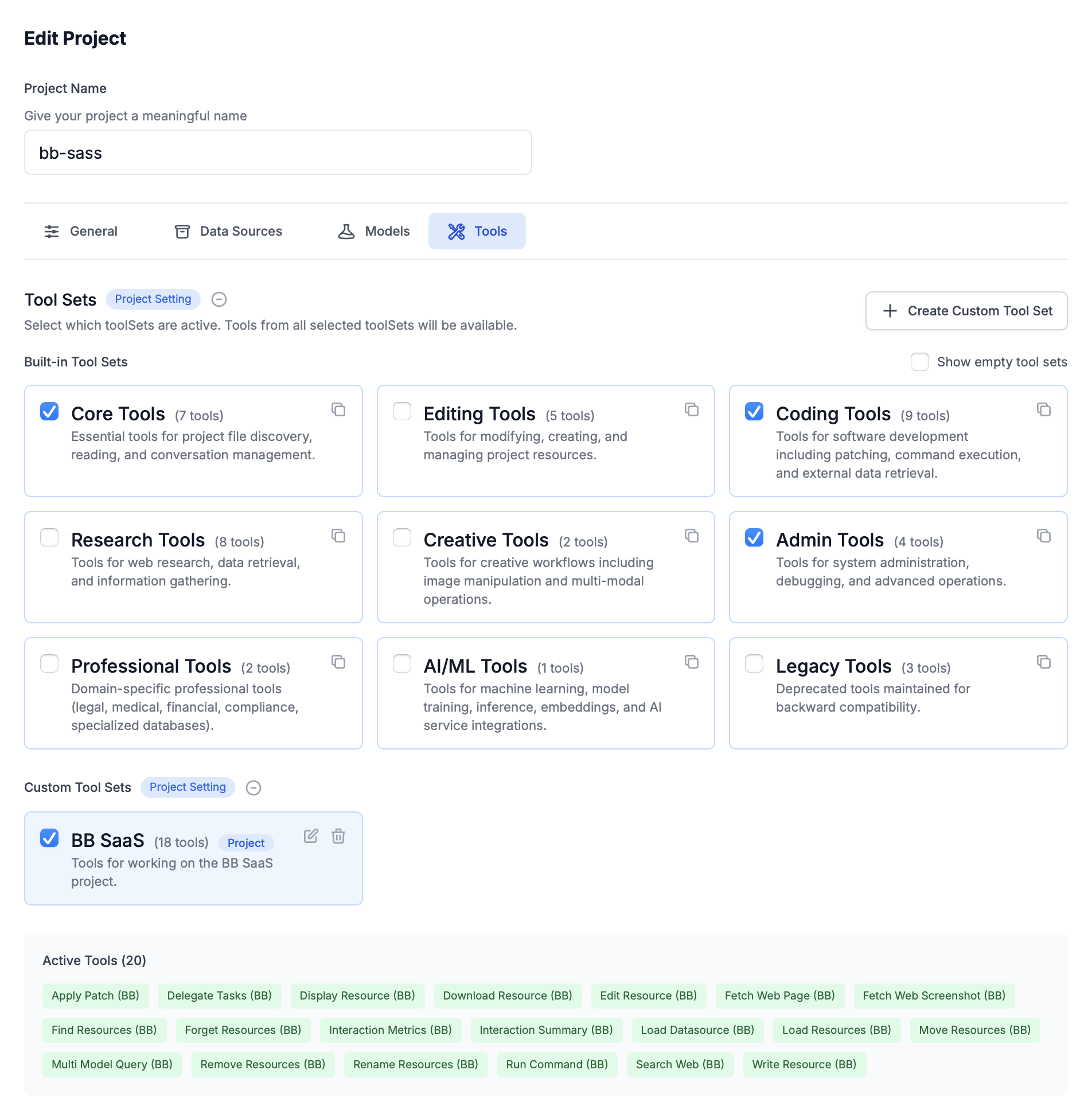
Important: When project tool sets are specified, they completely replace global tool set selections. The configurations don't merge.
Creating Custom Tool Sets
Combine tools from any source into custom tool sets tailored to your specific workflows.
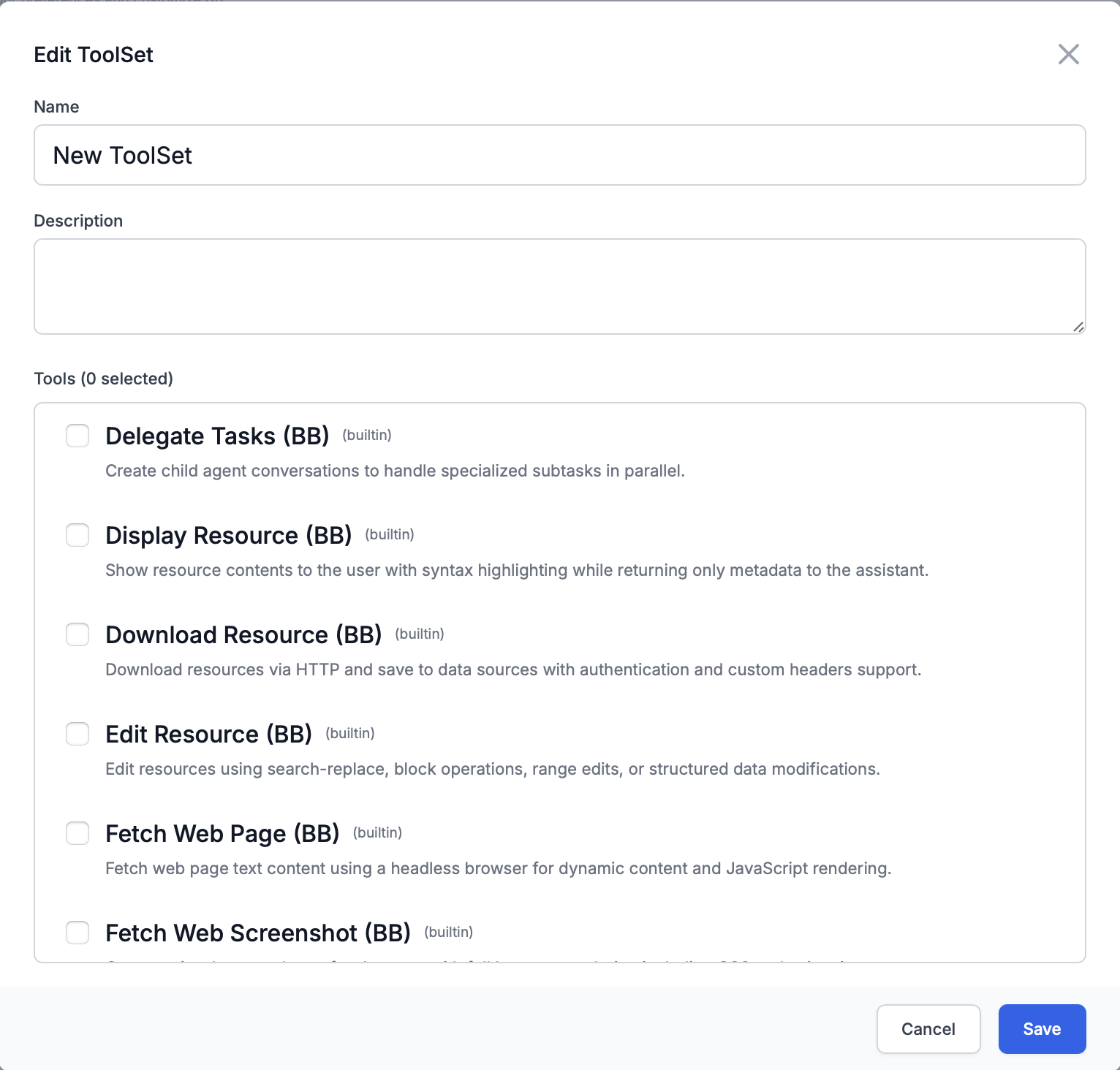
Custom Tool Set Features:
- Select specific tools from builtin tool sets
- Include tools from BB plugins
- Add tools from MCP servers
- Available in both global and project settings
- Reusable across multiple projects
Example Use Cases:
- Read-only Analysis: Core tools + research, excluding editing
- Safe Development: Coding tools without run_command
- Legal Workflows: Core + professional + specific legal plugins
Tool Configurations
Individual tools can be configured with specific settings to control their behavior. Configurations use YAML format and can be set at both global and project levels.
Global vs Project Tool Configurations
Like tool sets, tool configurations can be set globally and overridden at the project level.
Key Difference: When you configure a tool at the project level, that configuration completely replaces the global configuration for that tool. The configs don't merge.
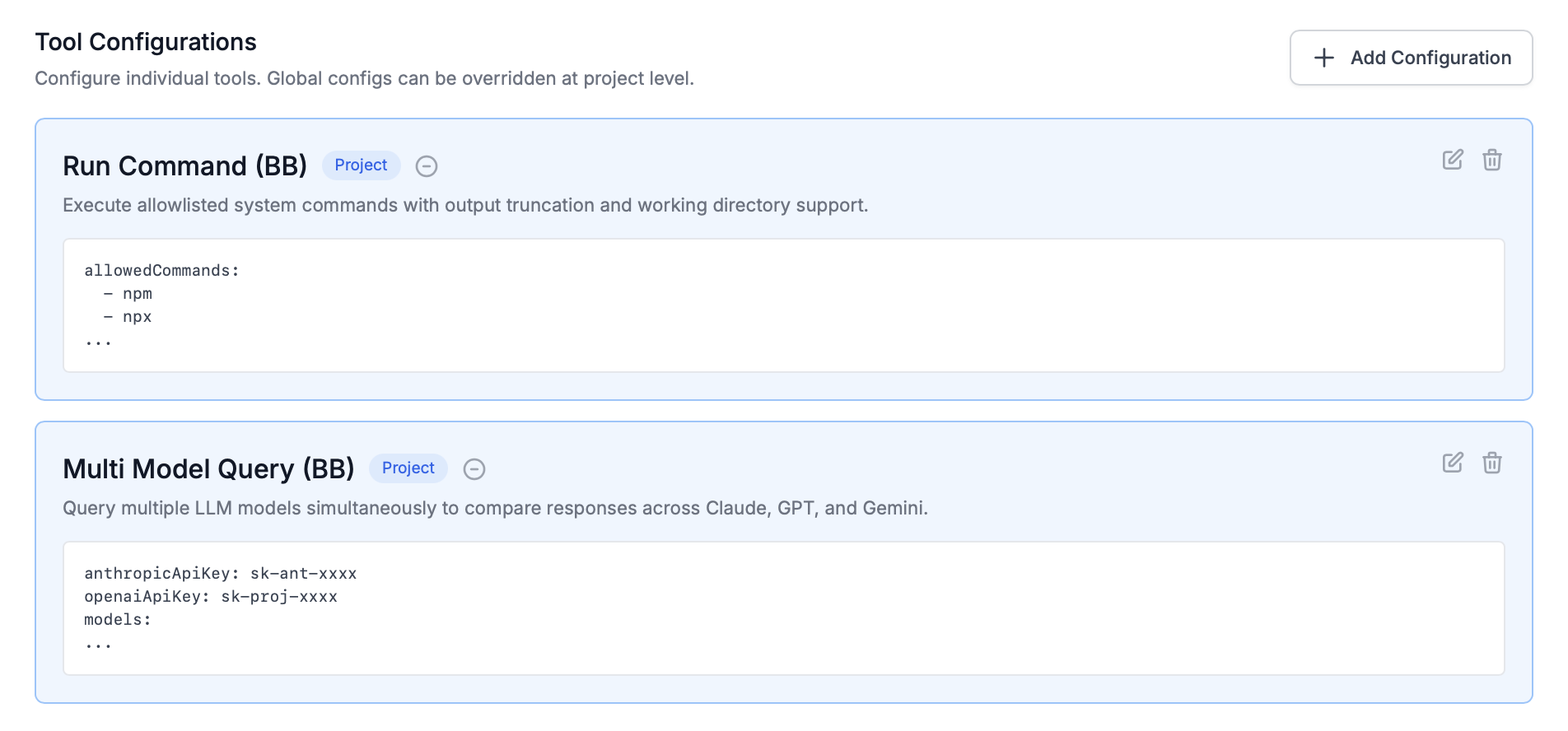
Editing Tool Configurations
Tool configurations are written in YAML with live syntax checking to catch errors before saving.
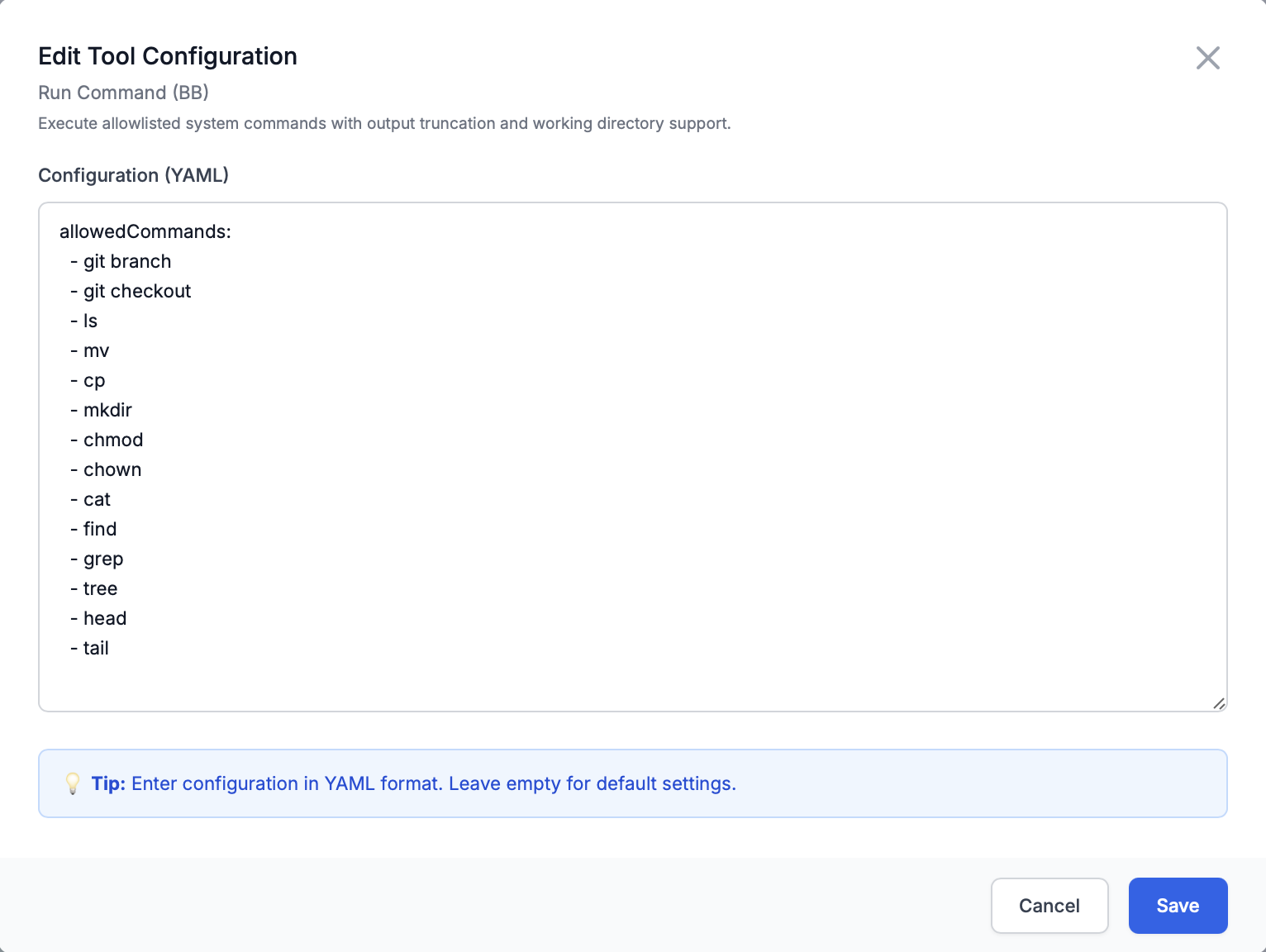
Configuration Features:
- YAML format for easy readability and editing
- Live syntax validation prevents invalid configs
- Override default tool behaviors
- Set tool-specific parameters and options
- Global configurations provide baseline settings
- Project configurations override for specific needs
Future Enhancement:
An upcoming version of BB will replace YAML editing with proper form fields for tool configurations, making it even easier to customize tool behavior.
BB Plugins and MCP Tools
Extend BB's capabilities beyond builtin tools by adding BB plugins or connecting MCP servers.
BB Plugins
BB plugins are specialized tools built specifically for Beyond Better. They integrate seamlessly with the tool system and can be assigned to tool sets.
- Created using the BB plugin SDK
- Can be assigned to any tool set category
- Appear alongside builtin tools in tool set selection
- Configurable through the tool configuration system
Finding and Creating BB Plugins:
Visit the BB Tools repository for community plugins and development resources:
github.com/Beyond-Better/bb-toolsMCP Server Tools
Model Context Protocol (MCP) servers can provide tools that BB makes available to the LLM. These tools are automatically categorized into the 'mcp' tool set.
- Configured globally in BB settings
- Available across all projects once configured
- Automatically appear in tool selection interfaces
- Can be included in custom tool sets
- Provide specialized capabilities from external services
Learn more about configuring and using MCP servers:
MCP Servers DocumentationBest Practices
Tool Set Selection Strategy
- Start Minimal: Begin with 'core' and add tool sets as needed
- Match Your Workflow: Select tool sets that align with project objectives
- Use Project Configs: Different projects have different tool needs
- Security First: Don't enable tools you don't need
- Review Regularly: Adjust tool sets as project needs evolve
Tool Configuration Tips
- Use Global Defaults: Set sensible baseline configurations globally
- Override When Needed: Project configs for project-specific requirements
- Test YAML Syntax: Use the live validator to catch errors
Custom Tool Sets
- Name Descriptively: Use clear names that indicate purpose
- Group Logically: Combine tools that work together
- Share Across Projects: Create custom tool sets for reuse
- Document Purpose: Add descriptions explaining the tool set's use case
Next Steps
MCP Servers
Learn how to connect Model Context Protocol servers and extend BB's capabilities.
Global Settings
Configure global defaults for API keys, model preferences, and tool settings.
Project Manager
Learn how to create and manage projects with custom tool configurations.
BB Tools Repository
Discover community plugins and learn how to create your own BB tools.
Last updated: November 16, 2025